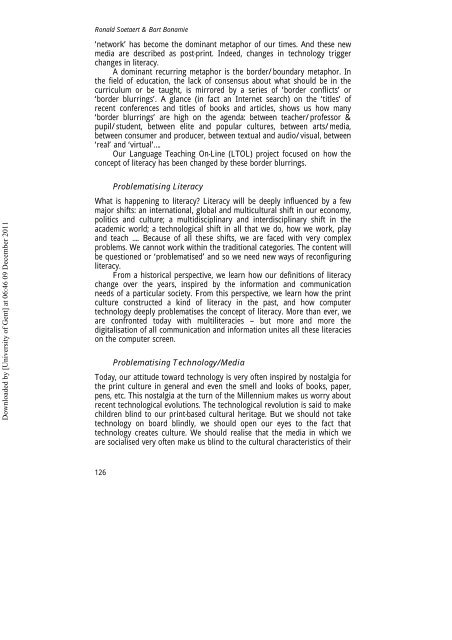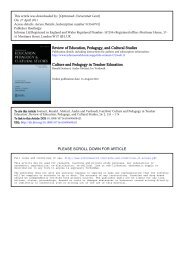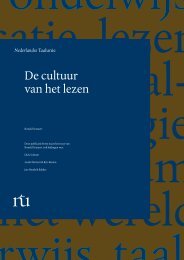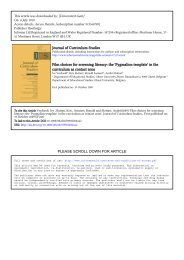a view informed by the problems of traditional literacy in a digital age
a view informed by the problems of traditional literacy in a digital age
a view informed by the problems of traditional literacy in a digital age
Create successful ePaper yourself
Turn your PDF publications into a flip-book with our unique Google optimized e-Paper software.
Downloaded <strong>by</strong> [University <strong>of</strong> Gent] at 06:46 09 December 2011<br />
Ronald Soetaert & Bart Bonamie<br />
‘network’ has become <strong>the</strong> dom<strong>in</strong>ant metaphor <strong>of</strong> our times. And <strong>the</strong>se new<br />
media are described as post-pr<strong>in</strong>t. Indeed, changes <strong>in</strong> technology trigger<br />
changes <strong>in</strong> <strong>literacy</strong>.<br />
A dom<strong>in</strong>ant recurr<strong>in</strong>g metaphor is <strong>the</strong> border/boundary metaphor. In<br />
<strong>the</strong> field <strong>of</strong> education, <strong>the</strong> lack <strong>of</strong> consensus about what should be <strong>in</strong> <strong>the</strong><br />
curriculum or be taught, is mirrored <strong>by</strong> a series <strong>of</strong> ‘border conflicts’ or<br />
‘border blurr<strong>in</strong>gs’. A glance (<strong>in</strong> fact an Internet search) on <strong>the</strong> ‘titles’ <strong>of</strong><br />
recent conferences and titles <strong>of</strong> books and articles, shows us how many<br />
‘border blurr<strong>in</strong>gs’ are high on <strong>the</strong> <strong>age</strong>nda: between teacher/pr<strong>of</strong>essor &<br />
pupil/student, between elite and popular cultures, between arts/media,<br />
between consumer and producer, between textual and audio/visual, between<br />
‘real’ and ‘virtual’….<br />
Our Langu<strong>age</strong> Teach<strong>in</strong>g On-L<strong>in</strong>e (LTOL) project focused on how <strong>the</strong><br />
concept <strong>of</strong> <strong>literacy</strong> has been changed <strong>by</strong> <strong>the</strong>se border blurr<strong>in</strong>gs.<br />
Problematis<strong>in</strong>g Literacy<br />
What is happen<strong>in</strong>g to <strong>literacy</strong>? Literacy will be deeply <strong>in</strong>fluenced <strong>by</strong> a few<br />
major shifts: an <strong>in</strong>ternational, global and multicultural shift <strong>in</strong> our economy,<br />
politics and culture; a multidiscipl<strong>in</strong>ary and <strong>in</strong>terdiscipl<strong>in</strong>ary shift <strong>in</strong> <strong>the</strong><br />
academic world; a technological shift <strong>in</strong> all that we do, how we work, play<br />
and teach …. Because <strong>of</strong> all <strong>the</strong>se shifts, we are faced with very complex<br />
<strong>problems</strong>. We cannot work with<strong>in</strong> <strong>the</strong> <strong>traditional</strong> categories. The content will<br />
be questioned or ‘problematised’ and so we need new ways <strong>of</strong> reconfigur<strong>in</strong>g<br />
<strong>literacy</strong>.<br />
From a historical perspective, we learn how our def<strong>in</strong>itions <strong>of</strong> <strong>literacy</strong><br />
change over <strong>the</strong> years, <strong>in</strong>spired <strong>by</strong> <strong>the</strong> <strong>in</strong>formation and communication<br />
needs <strong>of</strong> a particular society. From this perspective, we learn how <strong>the</strong> pr<strong>in</strong>t<br />
culture constructed a k<strong>in</strong>d <strong>of</strong> <strong>literacy</strong> <strong>in</strong> <strong>the</strong> past, and how computer<br />
technology deeply problematises <strong>the</strong> concept <strong>of</strong> <strong>literacy</strong>. More than ever, we<br />
are confronted today with multiliteracies – but more and more <strong>the</strong><br />
<strong>digital</strong>isation <strong>of</strong> all communication and <strong>in</strong>formation unites all <strong>the</strong>se literacies<br />
on <strong>the</strong> computer screen.<br />
Problematis<strong>in</strong>g Technology/Media<br />
Today, our attitude toward technology is very <strong>of</strong>ten <strong>in</strong>spired <strong>by</strong> nostalgia for<br />
<strong>the</strong> pr<strong>in</strong>t culture <strong>in</strong> general and even <strong>the</strong> smell and looks <strong>of</strong> books, paper,<br />
pens, etc. This nostalgia at <strong>the</strong> turn <strong>of</strong> <strong>the</strong> Millennium makes us worry about<br />
recent technological evolutions. The technological revolution is said to make<br />
children bl<strong>in</strong>d to our pr<strong>in</strong>t-based cultural herit<strong>age</strong>. But we should not take<br />
technology on board bl<strong>in</strong>dly, we should open our eyes to <strong>the</strong> fact that<br />
technology creates culture. We should realise that <strong>the</strong> media <strong>in</strong> which we<br />
are socialised very <strong>of</strong>ten make us bl<strong>in</strong>d to <strong>the</strong> cultural characteristics <strong>of</strong> <strong>the</strong>ir<br />
126





